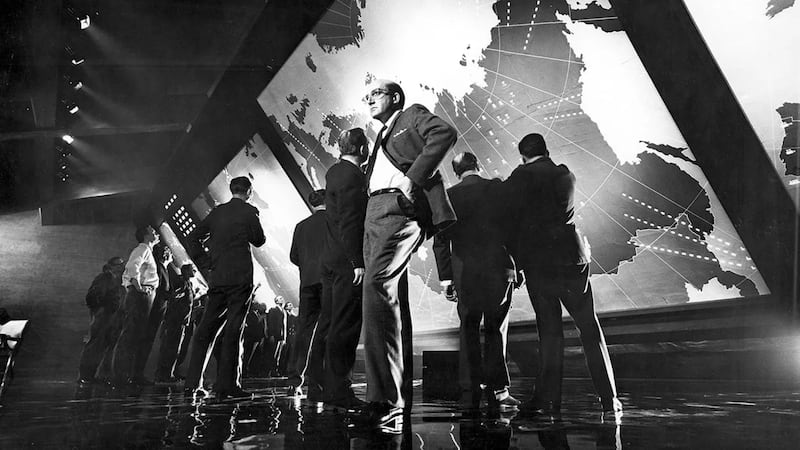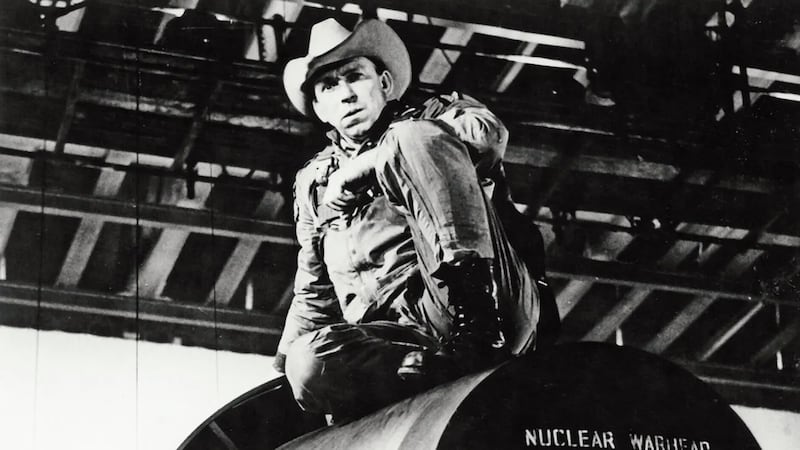DR STRANGELOVE has just turned 60, but it’s safe to say it’s lost little of its power to both amaze and amuse down the passing decades.
Stanley Kubrick’s jet black nuclear age satire feels as fresh today as the moment it hit cinema screens in 1964, and the points it makes about America’s political obsession with power, control and military force still seem totally on the money as well.
It’s much more than a clever fable about clueless politicians and war mongers sleepwalking us all into nuclear oblivion, of course. It’s also a gleefully ghoulish and often very childish comedy that boasts some truly unforgettable comic performances. That most of them come solely from one actor in the complex form of Peter Sellers almost goes without saying.
After making a mark playing several roles in Kubrick’s Lolita (1962), Sellers was tasked with taking on four characters in Strangelove. They included his manic turn as the wheelchair-bound US Government consultant/old school Nazi of the film’s title, the stiff upper-lipped British Captain Lionel Mandrake, the bland American President Merkin Muffley and the gung-ho Air Force Major TJ ‘King’ Kong.

Feeling that he couldn’t quite master the broad Texas accent required for the crazed Kong, Sellers turned that one down, allowing the great Slim Pickens to grab the prime role of the character who famously ‘rides’ the H-Bomb down to Earth.
Read more:
- Cult Movies: Stanley Kubrick's anti-war classic Paths of Glory one of his finest effortsOpens in new window
- Cult Movies: Mr Topaze might not be Peter Sellers' greatest but it's not far offOpens in new window
- Stanley Kubrick predicted the future, says Alan Yentob at exhibition openingOpens in new window
Rumour has it both John Wayne and Dan Block (of Bonanza fame) had already rejected the role, but Pickens plays it perfectly.

The three roles that Sellers does turn in are astonishing, and, if rumours are to be believed, owe much to his improvisational skills. Certainly, his show-stealing turn as the ex-Nazi, Strangelove, owed much to his ability for off-the-cuff mannerisms and ticks.
The tendency his character has for ‘alien hand syndrome’, which manifests itself in sudden, leather-gloved Nazi salutes, is all down to Sellers, and without his manic comic energy, Strangelove would be a much poorer and less amusing piece.
Of course, there are other characters like George C Scott’s General Buck Turgidson and Sterling Hayden’s Gen Jack D Ripper to savour as well: In Ripper, we’re given a ‘Reds under the bed’-obsessed maniac, who can’t stop raving about bodily fluids and the “purity” of American blood.
In the age of the wild, unhinged behaviour that we see in the global corridors of power today, it’s hard not to feel that Kubrick was something of a fortune teller as well as a uniquely gifted director.
More than anything, Dr Strangelove – or, to give it its full and none-more-60s title, Dr Strangelove or: How I Learned to Stop Worrying and Love The Bomb – is a film that nails the craziness of modern conflict in all its cold-hearted, utterly laughable insanity.
Kubrick had initially wanted to make a thriller about the Cold War panic that was everywhere at the time, but the more he studied the subject the more he came to believe that “nobody really knew anything and the whole situation was absurd”.
Now, if that doesn’t make you think “2024″, I don’t know what will.


